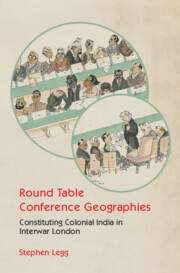Book contents
- Frontmatter
- Contents
- List of Figures and Tables
- Acknowledgements
- Note on Conversions, Spellings and Abbreviations
- 1 Introduction: Squaring Round Tables
- Part I Geographical Imaginations
- Part II Conference Infrastructures
- Part III The Conference City
- Part IV Representations
- Notes
- References
- Index
- Miscellaneous Endmatter
3 - Community: A Nation and a Table Divided
Published online by Cambridge University Press: 15 January 2023
- Frontmatter
- Contents
- List of Figures and Tables
- Acknowledgements
- Note on Conversions, Spellings and Abbreviations
- 1 Introduction: Squaring Round Tables
- Part I Geographical Imaginations
- Part II Conference Infrastructures
- Part III The Conference City
- Part IV Representations
- Notes
- References
- Index
- Miscellaneous Endmatter
Summary
If federation was the breakout star of the Round Table Conference (RTC), then the ‘minorities’ question was pitched as its melancholic twin. In India this question most regularly went under the title of communalism, explicitly tethering animosity between Hindus and Muslims (as the groupings were misleadingly generalised) to geographical imaginations of living communities in villages, towns and cities across the country. In Britain the question of these differences became both more abstract and more inclusive. Religious groups would be predominantly imagined as voting bodies that selected representatives across provincial and central legislative geographies. Community tensions here focused on abstract majorities and minorities in these chambers, not on lived differences in the galis, mohallas and bazars of everyday, everywhere India.
This abstraction also gave prominence to a broader range of minorities than communal politics in India commonly admitted. The debates of Hindu and Muslim leaders regarding their weightage in the assemblies of Bengal, the Punjab and New Delhi would still be centre stage. But Anglo- Indians, Indian Christians, Sikhs, Europeans and the ‘depressed classes’ all jostled for constitutional protection. When Gandhi launched his fast to the death against the communal award of August 1932, his ire was bent not on Hindu–Muslim politics but on Dr Ambedkar’s successful argument that depressed class minorities secure separate electorates to those of Hindus. While the story of communalism and the fractures of majority–minority politics in London is usually told through a melancholic lens, for those minorities who secured protections in the communal award, the RTC was a joyous success.
Such successes are eclipsed, however, in the standard narrative of the conference, which is that of failure. The communal question is commonly cited as the chief explanation for this failed conference. What this chapter will argue, however, is that the communal question did not just fracture the outcomes of the conference. Rather, it fractured the conference itself. The RTC was supposed to be an open conference, in the post-war spirit of transparency (see Chapter 4). But this conference method was thwarted, repeatedly, by the minority question. For fear of further provoking communal discord in India, solutions to the minority question were sought in private. When, belatedly, a Minorities Committee was formed in December 1930, the preference was for informal discussions, outside of the conference, that would inform reports to the committee.
- Type
- Chapter
- Information
- Round Table Conference GeographiesConstituting Colonial India in Interwar London, pp. 65 - 98Publisher: Cambridge University PressPrint publication year: 2023



